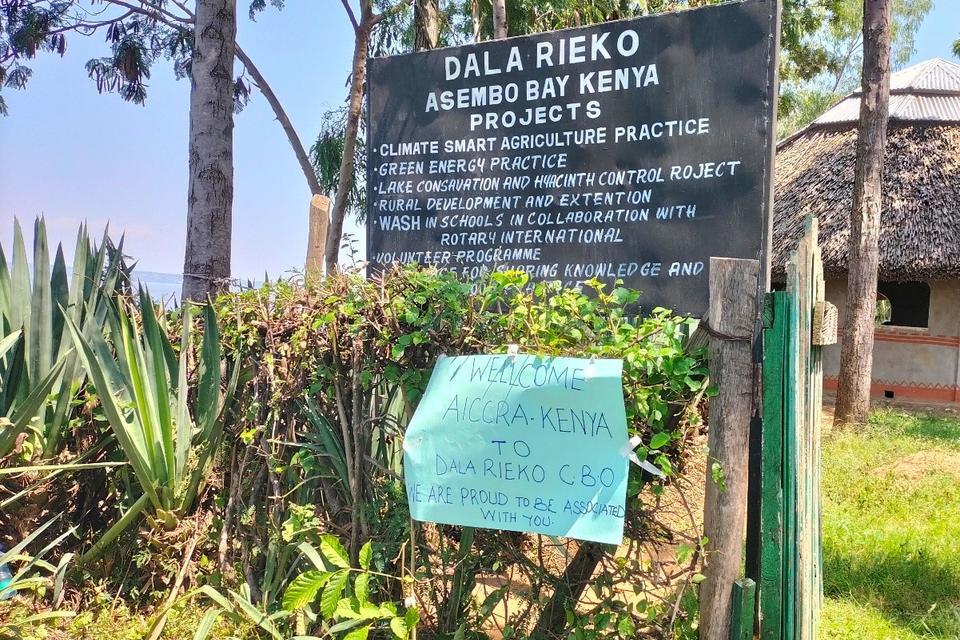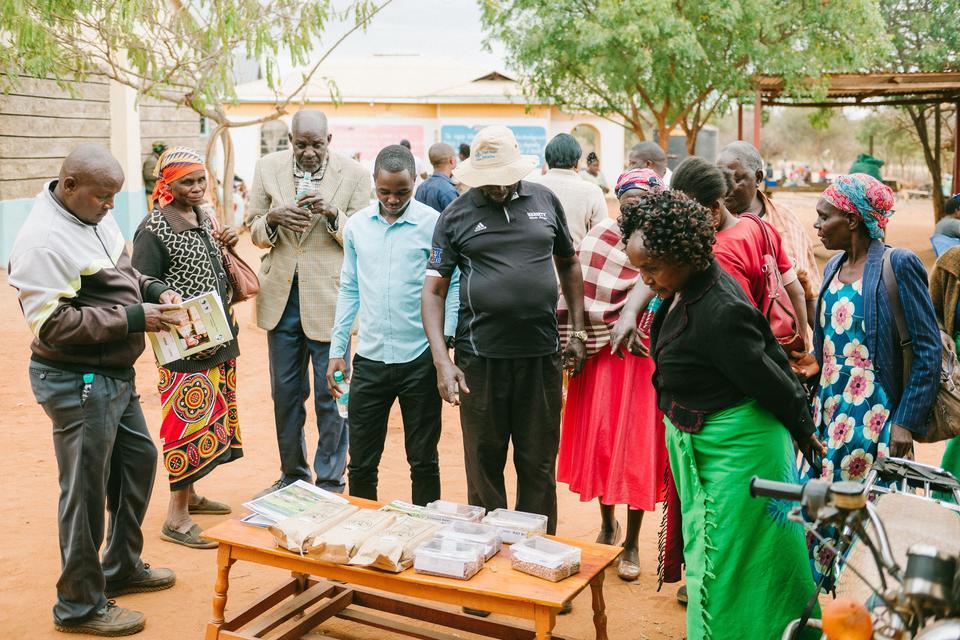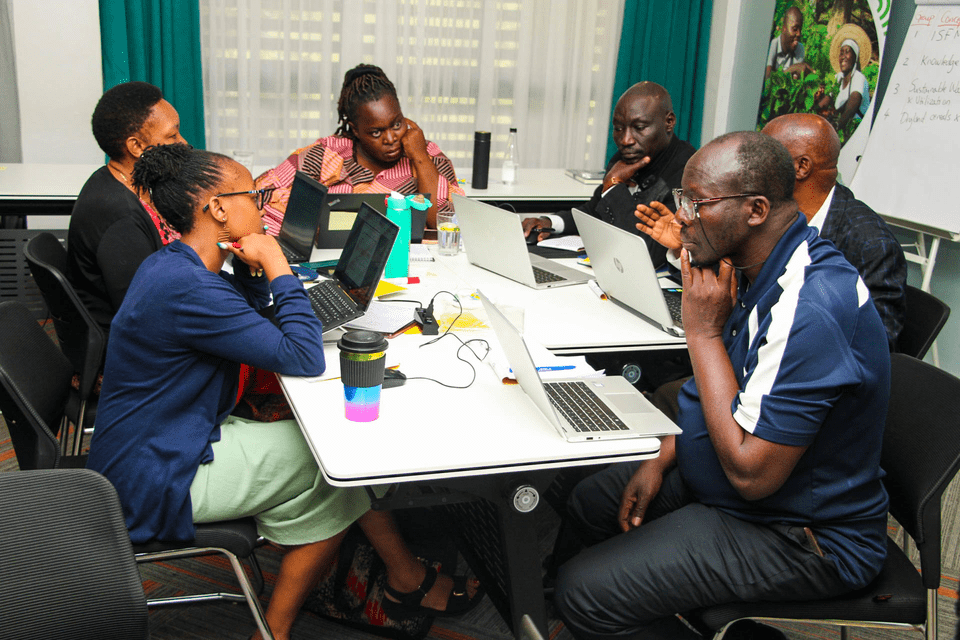Blog Women-led cooperative driving adoption of climate-smart agriculture strategies in Makindu, Makueni County
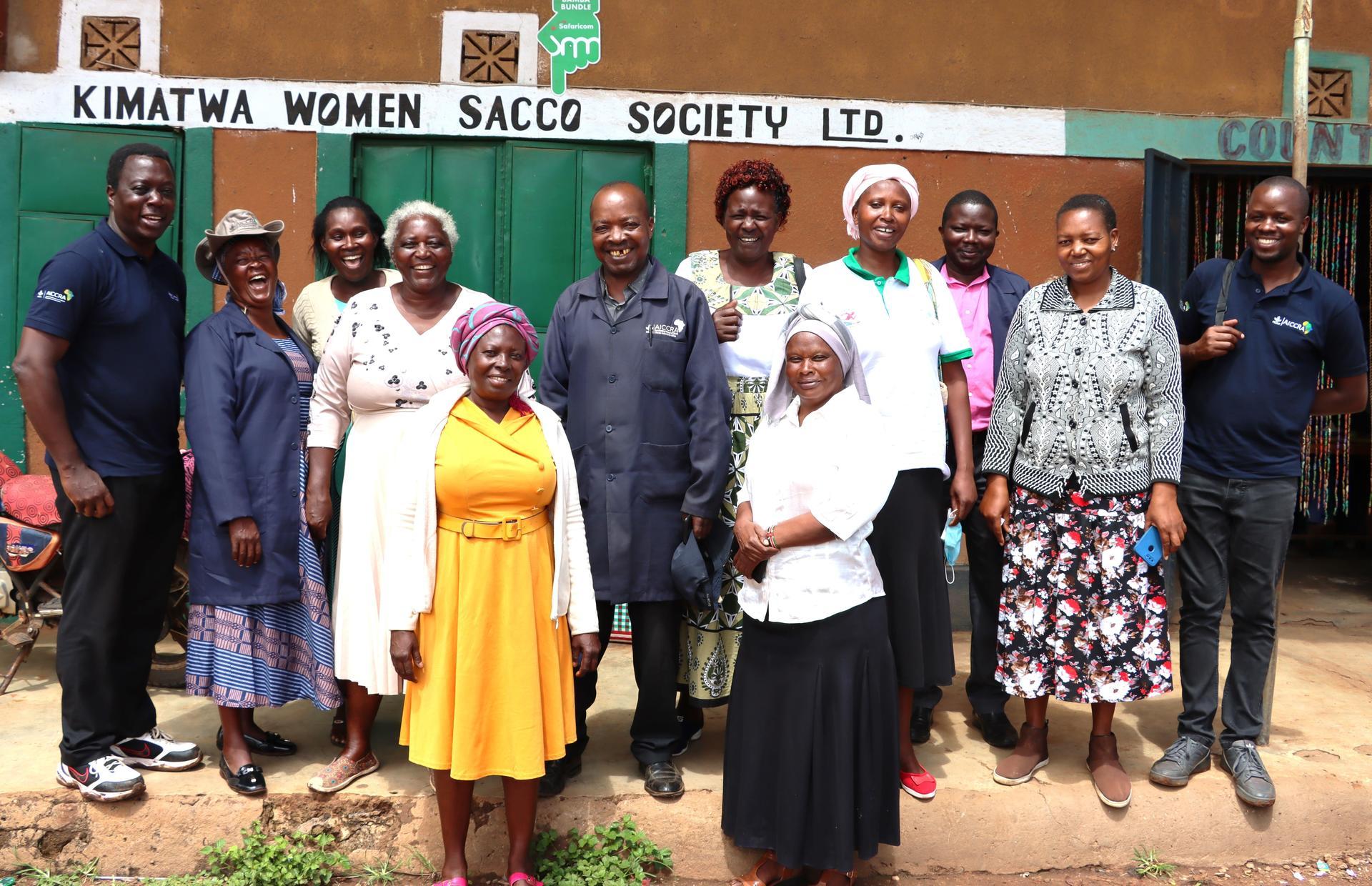
Women disproportionately bear the brunt of climate change impacts, often because they have limited access to services, resources, and technologies, which makes it difficult for them to adapt to a changing climate. Kimatwa Women SACCO in Makindu Makueni County has embarked on a journey to change this by promoting its members' adoption of climate-smart agriculture (CSA).
By: Bwema Ombati, Esther Nzuki, Boaz Waswa, Ivy Kinyua
Since the 1930s, farmers in the lower eastern regions of Machakos and Makueni in Kenya have a history of collective working through Mwethya groups- a name referring to organized farmer groups focusing on soil conservation. Farmers forming modern cooperatives have sustained this group model to work together to achieve their social and economic growth.
Kimatwa SACCO is a women-led cooperative serving over 700 members. The Society seeks to empower its members financially. Agriculture is one of the pillars through which the members are supported to grow as alluded to by the group chair.
“We offer agricultural loans to our members to engage in agriculture. But with climate change leading to frequent crop failure, some farmers lose their crops and default on the repayment. It is on this basis that we want them to adopt smart ways of farming to be profitable”, noted Theresiah Ngonze, Chairlady, Kimatwa SACCO
Linking with the Accelerating Impacts of CGIAR Climate Research for Africa (AICCRA) project, Kimatwa SACCO embarked on joint learning to scale and promote CSA technologies. AICCRA seeks to scale CSA and climate information services (CIS) so that they reach millions of small-scale farmers in Africa. This helps farmers adopt CSA - making agriculture more productive while adapting to or mitigating the effects of climate change.
The journey started with the sensitization sessions held in August 2023 where over 300 members were trained on aspects of CSA, CIS, financial literacy, and gender. Through a co-design approach, the AICCRA and Kimatwa SACCO adopted a Mother Baby Demo Approach for learning and scaling CSA practices. The approach involves three “levels” – mother trials, baby trials, and farmer experimentation. This trial design serves multiple functions: generating data on the performance of alternative technologies, creating the basis for researcher-farmer dialogue to refine the options being tested, and encouraging farmer experimentation even in the absence of researchers.
“We are dealing with a diverse community. The bundling of technical and social solutions is key to providing options for diverse farmers to choose from as they walk the journey to CSA adoption. The design of the mother-baby Approach enables us to demonstrate options for farmers to choose from”, noted Boaz Waswa, Soil Fertility Expert from Alliance Bioversity International and CIAT.
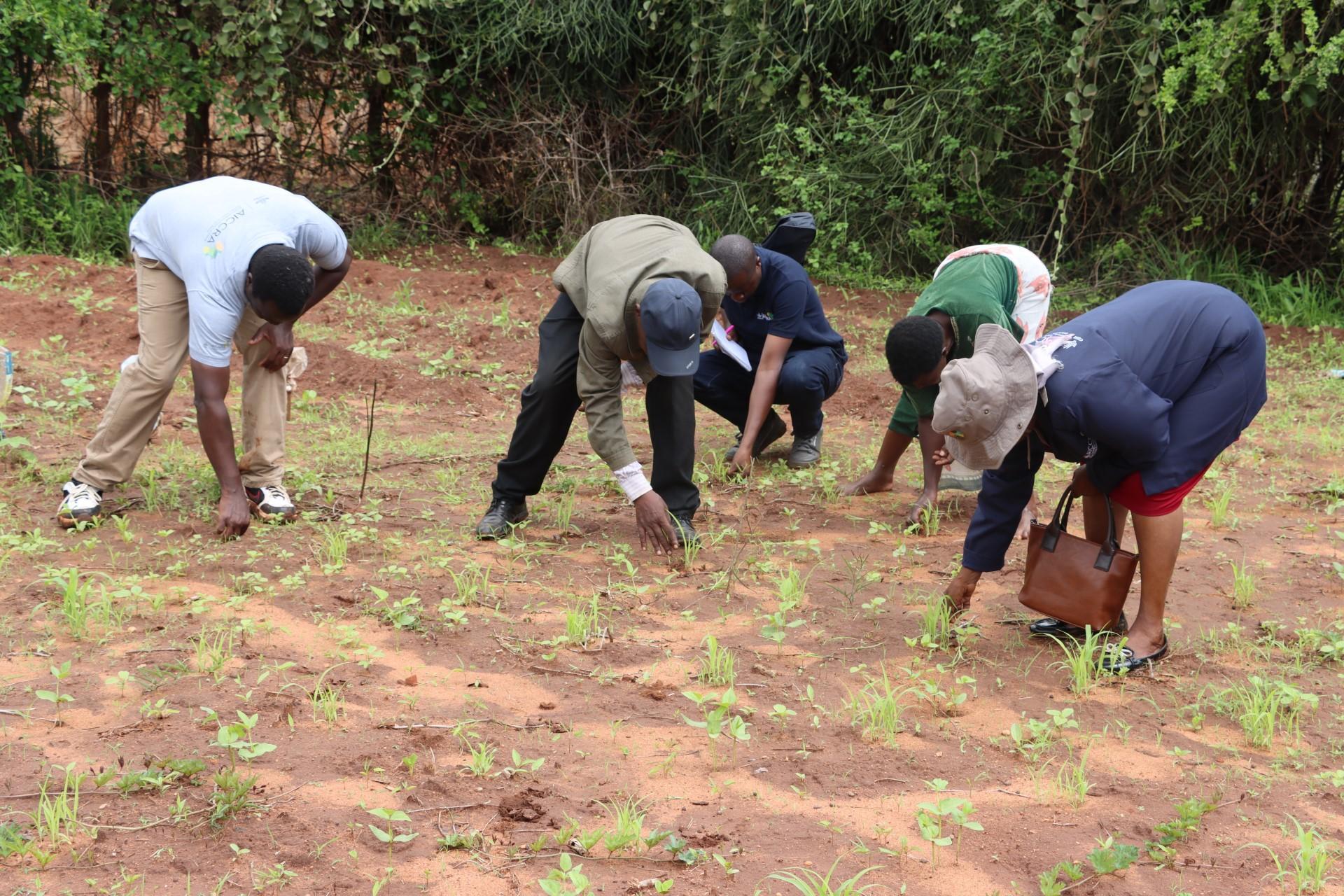
Thinning of sorghum. Credit: Esther Nzuki
Through the mother-baby Approach, the Cooperative organized the members into nine CSA clusters taking into consideration the geographical dispersion of the farmers. This was to ensure that learning was brought closer to the farmers. Each cluster identified a Cluster Leader as a champion farmer to support and coordinate the learning. The clusters established a mother demo with diverse CSA technologies promoted. This mother demo served as a central learning and training site. The individual farmers were encouraged to pick a preferred CSA technology combination from the mother demo to try it on their farms, serving as the baby demos. Farmers were encouraged to experiment with the technologies and share feedback which could inform the scaling of these CSA innovations.
A recent field visit to Makueni revealed that farmers are testing various CSA technologies and practices. Nine Mother demos and at least 45 baby demos have been established proximal to the farmer clusters. The technologies promoted include growing drought-tolerant varieties among them short-duration maize (KDV01), sorghum (GADAM), and legumes such as common bean (Nyota variety- a high iron and zinc), cowpeas (M66, KVU27), and green grams (Karembo and Biashara). The farmers have accompanied the varieties with water and nutrient management and regenerative technologies such as using organic manure, mulching, ripping, planting basins, Zai pits, and innovative crop diversification systems.
I got 2 kg of Nyota beans and KDVO1 maize through Kimatwa SACCO. The CSA technology I practice is the use of Zai pits. The challenge I got is the cost of labor. We pay Ksh. 300 for a day’s work or Ksh. 30-70. I dug 300 Zai pits on my farm. This technology has proven to be effective; the crops are healthy since Zai pits concentrate nutrients and retain moisture. What I love most about this practice is that it occupies minimal space but with much produce. Hopefully, if all goes well, I won’t mind adding more Zai pits. Being the first time, we are trying out this technology we hope for a good harvest”, Josephine Mwende, a single mother of seven and a dedicated farmer at Kimboo Stars
The journey to the uptake has come with its fair share of learnings for which the farmers and the project are embracing to find solutions. Shifting from conventional ploughing to minimal tillage using ripping demands a mindset change by the farmers. The project has embarked on changing this through demonstration and training.
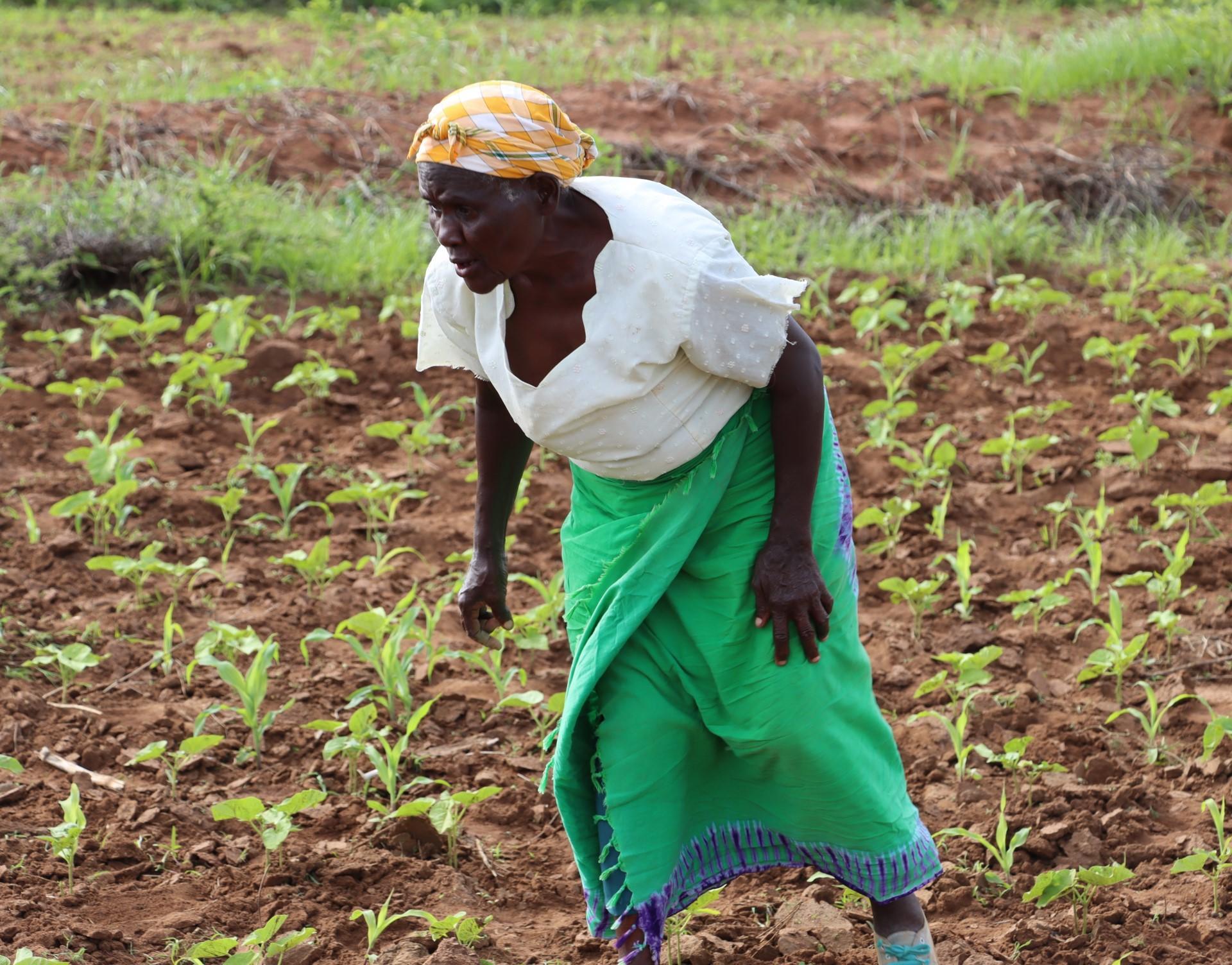
Rhodah Nzioka A farmer in Makindu practising CSA. Credit: Esther Nzuki
My children work in town, and some go to school. I am left alone on the farm. At my age, I struggled to dig the basins and Zai pits. It was expensive hiring people to help, noted Rhoda Nzioka a 70-year-old farmer from Mulili Cluster.
Some of the technologies are labor-intensive, especially considering that most of the farmers are women and elderly. The majority of the farmers opted to dig the pits off-season when labour demand was low and cheap. Some hired extra labour to dig the basins. The clusters also benefited from collective support through the innovative Mwethyas, where they would help one another dig the basins and pits from farm to farm. As an alternative, the Cooperative offered tractor-ripping services with an incentive of Rip-1-Get-1 Free. This not only increased the uptake of the mechanized CSA but also increased the utility of the tractor and equipment, labor productivity, and resulted in increased income from the tractor service provision by the Cooperative.
The project is undertaking a cost-benefit analysis to understand the return on investment from the use of the CSA technologies, Bwema Ombati, a Consultant at the Alliance of Bioversity and CIAT.
The project team noted farmer innovations around the CSA technologies as evidenced in the modifications of the cropping configurations, types of organic manure used, and the placement of the seed in the furrows and on the raised bunds.
Some farmers expressed concern about the lack of access to certified seeds of the drought-tolerant varieties. The project facilitated access to the seed for use in the mother demos to create awareness and demand. The AICCRA project working with the cooperative designed and initiated a seed revolving scheme where farmers could access the drought tolerant varieties as part of the agricultural loan and refund back part of the grain at harvest. The returned grain especially the legumes would be recycled as farmer saved seed or sold and cash ploughed back into buying new seed for more farmers. At the pilot level, the seed revolving scheme has benefitted 145 farmers of which 77% are women.
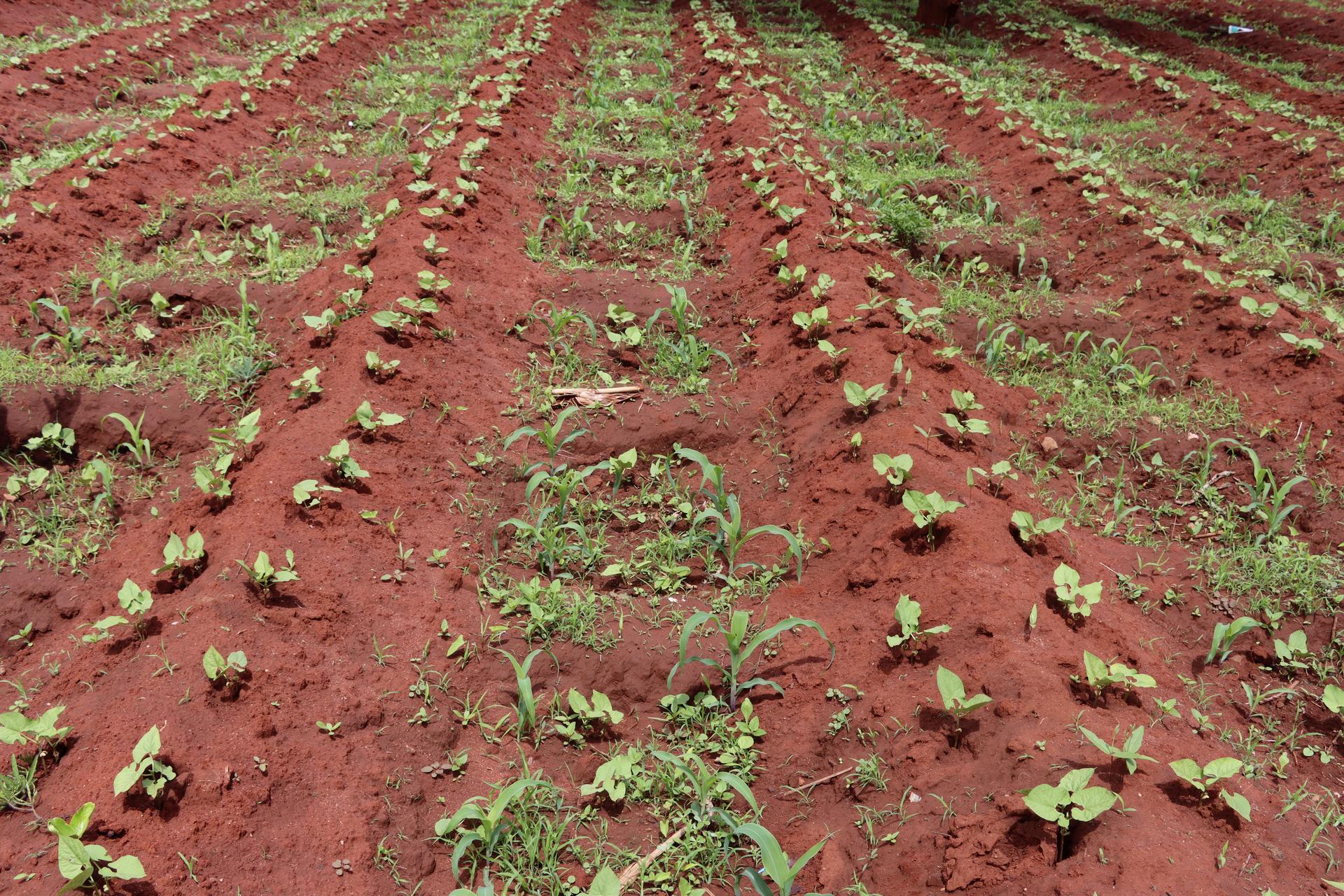
Modification of cropping configurations. Credit: Esther Nzuki
The CSA technologies are knowledge-intensive for example, farmers needed training to set up the basins and Zai pits, and ripping. Farmers needed training in the various crop diversification configurations and the other aspects of crop pest, disease, and nutrition management. Working with the County Agriculture extension officers has helped to deliver much-needed extension support to the farmers. The project used a cascaded approach to learning by working with the Ward Agricultural officer to train the Cluster leaders who then trained the farmers. Regular visits by the extension officer have helped to reinforce the learning. Part of the learning is also achieved using the Makindu Lead Farmers WhatsApp group.
The social-technical innovation bundling around CSA through women-led cooperatives offers a platform to scale CSA among smallholder farmers. With the continual advancements in CSA technologies and increasing support for women entrepreneurs, the future looks bright for the farmers, as the Alliance through AICCRA aims to enhance gender equality and nutrition through climate action and monitoring progress. This kind of collaborative approach, championed by women in agriculture through cooperative endeavor, stands as a beacon of progress and a testament to women’s leadership in driving impactful change!!
The Team

Boaz S. Waswa
Scientist
Ivy Kinyua
Research AssociateSee Also
